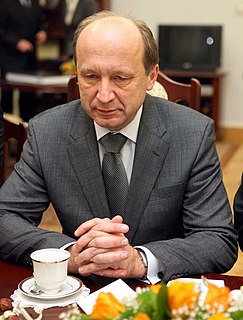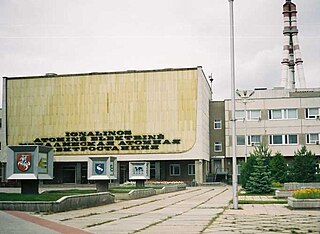Since the introduction of parliamentarism in Sweden, six national referendums have been held. Legal provisions for referendums were introduced in 1922, one year after the adoption of universal suffrage. The Constitution of Sweden provides for binding referendums, but all referendums held as of 2012 have been non-binding. The latest referendum, on adopting the euro, was held on 14 September 2003.

Visaginas is the centre of Lithuania's youngest municipality, located on the north-eastern edge of the country. It was built as a town for workers engaged in the construction of the Ignalina Nuclear Power Plant. Russian is the first language of the vast majority of town population. Originally the aerial view of Visaginas was designed to resemble a butterfly, however, after work on the nuclear power plant was cancelled, so was further construction of the town. Currently Visaginas consists of three residential regions that locals refer to as the 1st, 2nd and 3rd Microdistricts. Visaginas has 14 streets. The city grew up in a pine forest by Lake Visaginas. Tourism is currently an area of great potential, as is the possibility of a new nuclear power plant.

The Lungmen Nuclear Power Plant, located nearby Fulong Beach, Gongliao District, New Taipei City, is Taiwan's fourth nuclear power plant, consisting of two ABWRs each of 1,300 MWe net. It is owned by Taiwan Power Company (Taipower). It was intended to be the first of these advanced Generation III reactors built outside Japan. In 2014 construction of the plant was deferred.

The State Border Guard Service or SBGS is the organisation under the authority of the Ministry of the Interior charged with controlling and maintaining the security of Lithuanian borders on land, in the Baltic Sea and the Curonian Lagoon. Since December 21, 2007, Lithuania is part of the Schengen Area and SBGS, partner of Frontex, controls about 1,070 kilometres (660 mi) of Area's external land border with Kaliningrad Oblast and Belarus.
Five nationwide popular referendums were held in Italy on 8 November 1987, with three questions about nuclear energy after the Chernobyl disaster, and two questions about justice. Voting day had been postponed of six months, according to the Italian Constitution, because of the snap election of spring.

Parliamentary elections were held in Lithuania on 12 October 2008, with a second round on 26 October in the constituencies where no candidate won a majority in the first round of voting. All 141 seats in the Seimas were up for election; 71 in single-seat constituencies elected by majority vote and the remaining 70 in a nationwide constituency based on proportional representation. Together with the elections, a referendum on extending the operation of Ignalina Nuclear Power Plant was held.
LEO LT AB or Lithuanian Electricity Organization was a national energy holding company in Lithuania. The company owned shares of Lithuania's three major electric power production and distribution companies. It was established in early 2008 to raise funds for the construction of the planned Visaginas Nuclear Power Plant after close down of Ignalina Plant, and Lithuania–Sweden and Lithuania–Poland power connections. The decision to liquidate the company, mired in controversies and attacked by critics, was reached by the shareholder of LEO LT on 4 September 2009.

Visaginas Nuclear Power Plant is a planned nuclear power plant project in Lithuania. It was proposed to be built at the site of the closed Ignalina Nuclear Power Plant, which was shut down on 31 December 2009 in accordance with Lithuania's accession agreement to the European Union. The two reactors of the Ignalina plant are currently undergoing a decommissioning process.

The Elektrėnai Power Plant or Lithuania Power Plant is an 1,800-MW electrical generating station near Elektrėnai, Lithuania, about 50 kilometres (31 mi) west of Lithuania's capital, Vilnius. It is operated by Lietuvos Elektrinė, a subsidiary of Lietuvos Energija.

The Lithuanian Center Party is a political party in Lithuania. Since the Seimas elections in 2016, it has been represented in the parliament and has also had representatives at the municipal level. The leader of the party is Naglis Puteikis. Its honorary leader was noted Lithuanian philosopher and anti-globalist thinker Romualdas Ozolas.
Lithuania does not have any operational nuclear power reactor. It operated two RBMK reactors at Ignalina nuclear power plant which were shut down in 2004 and 2009.
In the 1980s, Poland had four Soviet VVER-440 reactors under construction, but the project was canceled in 1990. The Żarnowiec Nuclear Power Plant was cancelled due to strongly unfavorable public opinion, and the then-recent Chernobyl disaster.
NUKEM Technologies GmbH is a nuclear engineering and consulting company managing radioactive waste and spent fuel and decommissioning of nuclear facilities. The company is located in Alzenau, Germany. It was established in 2006 as a subsidiary of Nukem Energy. On 14 December 2009, Nukem Technologies was sold to Russian Atomstroyexport for €23.5 million.

Presidential elections were held in Lithuania on 11 May 2014, with a second round held on 25 May between the top two candidates from the first round. In the second round, incumbent President Dalia Grybauskaitė was re-elected with 58% of the vote.

An advisory referendum on the construction of a new nuclear power station was held in Lithuania on 14 October 2012, alongside parliamentary elections. The proposal was rejected by 65% of voters.
Events in the year 2012 in Lithuania.

A referendum on building a new nuclear power plant was held in Bulgaria on 27 January 2013. Whilst it was not explicitly mentioned in the question, it was widely acknowledged that the referendum was about restarting construction at the Belene Nuclear Power Plant.
Chernobyl is an upcoming historical drama television miniseries created by Craig Mazin. The series, a co-production between American cable network HBO and British television network Sky, is set to premiere in both the United States and the United Kingdom on May 6, 2019. The series depicts the Chernobyl disaster that occurred in Ukrainian SSR in 1986.













